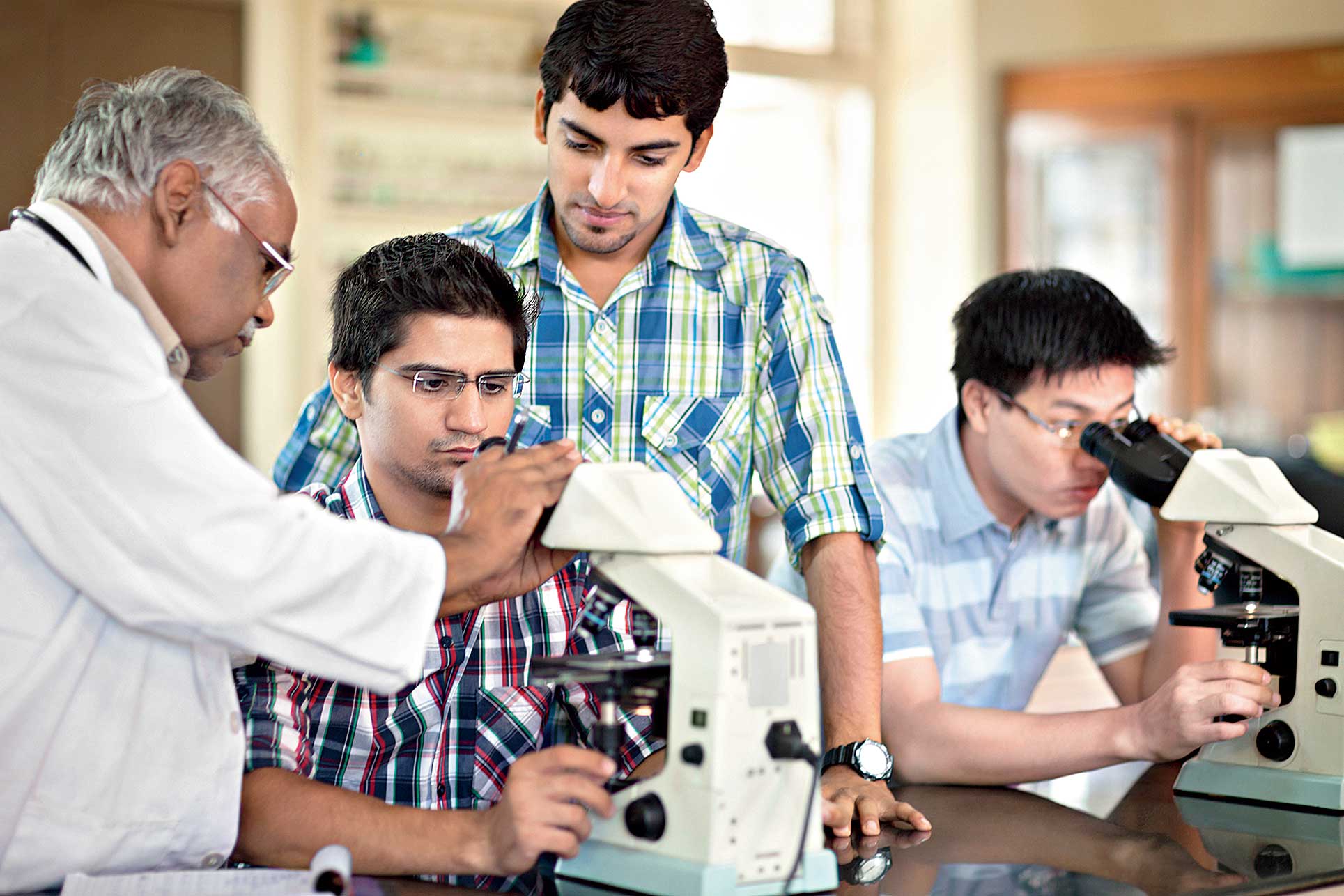The board exams are inching closer and it will soon be time to choose a discipline for higher studies. While the choice is comparatively easier — science, commerce or humanities — after Class X, it becomes a little more long-term after Class XII. Of those who take up science in Plus Two, quite a few go on to join engineering or medical colleges while many others major in basic sciences. Most school students know nothing about a doctoral degree but, if you are taking up the study of science, you should at the very least acquaint yourself with this option. It could give you the chance to call a laboratory your second home.
“Only those with the passion to dig into the unknown secrets of life and technology and the confidence to solve problems using indigenous and out-of-the-box solutions should take up science for higher studies,” says Koustubh Panda, professor in the department of biotechnology as well as Guha Centre for Genetic Engineering and Biotechnology, Calcutta University, and the director of West Bengal Biotech Development Corporation.
A researcher is a person with the patience to work for months, even years, on a topic to extract answers that will eventually help mankind. These are the people about whom neighbours and cousins scratch their heads and ask whether they are still studying or have finally landed a job.
For me, the route to a lab was difficult, challenging yet fun — whether it be taking up science in Plus Two or majoring in a stream of bioscience. Little did I know while pursuing BSc that I would end up being interested in a doctoral degree. For others though, being a researcher has been a long-cherished dream.
Arnab Gupta says he was a curious kid who got interested in science in school, during the time the human genome was completely sequenced. “Life at Johns Hopkins University, US, as a postdoctoral fellow was an eye opener. Working with the best and brightest and meeting Nobel laureates at cafes and libraries on campus was like living a dream. It taught me to ask difficult questions and try to answer them simply,” says the young scientist who is now an associate professor at the department of biological sciences, IISER Kolkata.
If you are one of those people who are interested in designing experiments and working on novel problems, doctoral studies and research may be your true calling. Choosing each step, one at
a time, might help clarify your doubts and make you more confident about your choice. You don’t need to decide right away where you want to do a PhD, you still have a lot of time. But it is good to keep your eyes open to the opportunities available — such as when you fill up forms for college.
Keep in mind that many research institutes offer integrated bachelor’s and master’s (BS-MS) as well as master’s and doctoral (MS-PhD) degrees. It may be difficult for some to commit to five or seven years of study. If in doubt, take up the degrees one at a time, moving on to the next if you so wish.
If you want to give working in a lab a shot, start preparing for competitive exams such as GATE, NET (for pursuing doctoral research in India) or GRE, TOEFL/IELTS (for pursuing doctoral research abroad) along with your master’s curriculum.
“I was interested in science since childhood and enjoy teaching, supervising students and continuing research in basic science. My request to students is to dream big and work hard,” says Arobendo Mondal, postdoctoral fellow in the department of theoretical chemistry at The Technical University of Munich, Germany. He was recently at his alma mater, IISER Kolkata, to deliver a talk.
Keeping oneself abreast of recent advances in science or applying for summer programmes in India or abroad are also good options. The Indian Academy of Sciences (IAS) fellowship and Khorana Program for Scholars offer brief stints at a lab, helping you figure out whether you are cut out for lab work. However, it is best if you do not generalise labs depending on one experience — good or bad. Each lab has a different way of functioning.
There are disadvantages of working in a lab too — it is easy to get disillusioned when you see a friend with an MBA land a job with a whopping Rs 24 lakh per annum package while your path is still beset with insecurity. This lack of financial security goaded Dr Krishnendu Das to give up working at a research lab in the National Institute of Cholera and Enteric Diseases, Calcutta, after two years and join the city-based ESI Medical College as biochemistry tutor. “Financial insecurities and family responsibilities made my focus deviate and I chose to return to medicine,” says Dr Das.
For those of you about to sit for your board exams, there is still a bit of time before you have to take a call on joining a lab. Till then, let us keep the fire of knowledge burning and strengthen our basic concepts. Who knows, a Class XII question might be hurled your way during your PhD interview.
Curiosity counts
Pros
- Unlike a 9-5 job, every day is different and exciting
- You can satisfy your curiosity, work independently and be an expert
- You get to travel in India and abroad for conferences and programmes
Cons
- Zero social life as work eats up all your time
- Financial stability and job security come much later in life











